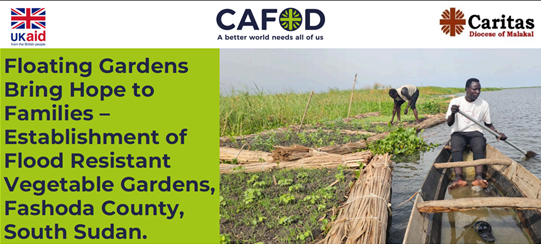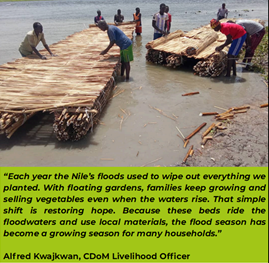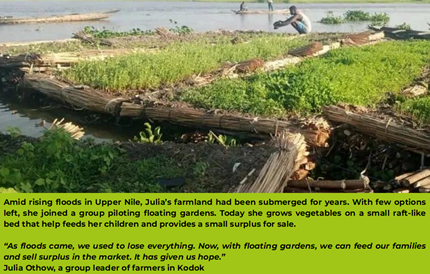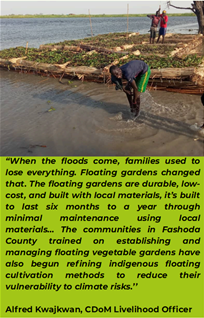
Innovation for Building Resilience in the Face of Climate Change
For years, communities in Fashoda County, Upper Nile State, have endured devastating floods. With most settlements along the Nile River and on flat plains, seasonal and flash floods repeatedly wash away crops and threaten food security. Families already displaced by conflict and climate shocks face the added burden of losing their livelihoods during the flood season and are increasingly dependent on food aid. Repeated crop failures deepen food shortages, malnutrition, and vulnerability. In this fragile context, climate adaptation is not a choice – it is a lifeline.

CAFOD is implementing the FCDO- funded South Sudan Humanitarian & Resilience Programme (SSHARP) – Transforming Household Resilience through Inclusive Economic Development (THRIVE) in Greater Upper Nile, South Sudan, as part of a consortium led by GOAL. In Fashoda, CAFOD and local implementing partner, Caritas Diocese of Malakal (CDoM) have introduced an innovative, climate-adaptive solution, called floating gardens. Built from locally available materials such as bamboo, water hyacinth, floating light woods and reeds, these gardens float on floodwater, providing a stable platform for vegetable production throughout the flood season. To strengthen community resilience, THRIVE mobilised residents across three target locations (payams) to establish flood-resistant vegetable gardens as an adaptive mechanism for continuous household food and income security during floods.

Scaling Up

The innovation has quickly gained traction. Inspired by early results, an additional 40 farmers self organised in groups in Dier Kodok Boma, Kodok Payam, approached THRIVE team in Fashoda for technical support and training, resulting inthem creating their own floating gardens. These groups are now growing tomatoes, onions, okra, kudra, and collards on floating plots, ensuring food at home and generating income from market sales. This scale-up reflects strong community ownership and sustainability as well as the positive influence of the initial floating gardens innovation.. Beyond nutrition and livelihoods, the gardens have a potential to showcase resilience, self-reliance, and hope. The project team continues to engage these trained farmers to expand, cascade, and replicate the approach across all Payams and Bomas of Fashoda County. This innovative, locally led practice demonstrates how adaptation to climate change can safeguard livelihoods, reduce reliance on humanitarian aid, and enable communities to chart a sustainable path toward resilience in one of South Sudan’s most flood-affected regions. With FCDO support catalyzing both piloting and replication, scaling up will amplify nutrition, income, and dignity across more households. Realizing this potential will require increased funding, stronger collaboration, and sustained commitment from all stakeholders.

thanks for sharing
https://shorturl.fm/Q55xv
https://shorturl.fm/HTfwL
https://shorturl.fm/FCFJp
https://shorturl.fm/oE8oh
https://shorturl.fm/lYzUw
https://shorturl.fm/cMIGF
https://shorturl.fm/BJy4Z
https://shorturl.fm/2M4bo